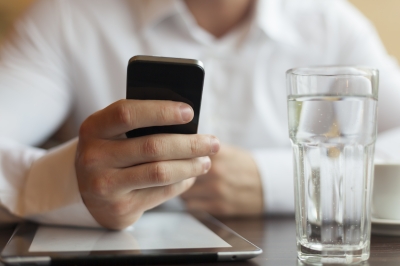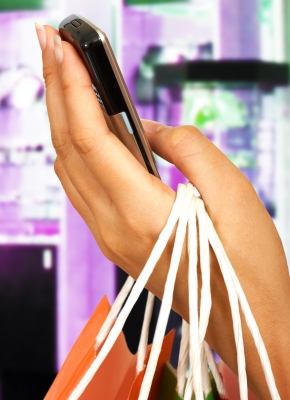Are you digitally addicted? The cost of constant connection.

Digital distractions keeping us from ourselves and others
Sherry Turkle, author of Alone Together: Why We Expect More from Technology and Less from Each Other Consider writes, “Facebook, it’s human contact, only easier to engage with and easier to avoid. Developing technology promises closeness. Sometimes it delivers, but much of our modern life leaves us less connected with people and more connected to simulations of them.”
We’re moving from a people-centric existence into a life where daily digital immersion removes us from the person across the table, the now and ease with doing nothing. Boredom's hit a new normal and low threshold. If we're not chronically entertained with digital distractions rather than our own thoughts or real life in the moment, we're bored.
When we turn off our radios, TVs, iPods, iPods and smart phones, the silence no longer feels like earned quiet after a loud day, it’s achingly oppressive, maybe even a little lonely.
I don't consider myself addicted to my screens but my brain is so wired after extensive computer time that even though I believe in say, the benefit of meditation to relax the mind, the idea of slowing down my brain sounds unlikely. I manage three minutes of silent “corpse pose” at the end of my yoga class and I figure I’ve met my quota for stillness.
The other night I caught myself Googling a movie’s film’s reviews and the name of the actor playing a sad scene while the sad scene was playing, as if these factoids would have added to the complex feeling the director spent millions to give me.
Moments replaced with Google search.

Digital detox: noticing the natural world
One of my favorite essayists Barbara Kingsolver writes in her piece “The Forest in the Seeds.” about slowing our minds and re-tuning our awareness to the entertainment the natural world unfolds in every moment.
“….I also long for all of us to rescue ourselves from the tyranny of impatience. Like cartoon characters, we seem to be running full tilt through the air beyond the edge of a cliff with our minds on something else.”
Our phones are more often that “something else.” Once upon a time we apologized all over ourselves if our cell phone interrupted our time with friends and family. Now our devices are permanent guests, a necessary appendage that without them we become anxious, self-conscious and half-dressed, unsure what to do with our tapping hands and unanchored focus.
"Every time you fall out of a relationship with someone and into your Blackberry, or crackberry or IPhone or whatever it is, you fall out of a relationship with who you're with. And it does have a real impact on our families and our work lives." Addiction specialist Brad Lamm in an interview for CBS's "Are you addicted to your digital devices?" October 17, 2011.
I find myself desperately looking for my phone more often this year than last. When my daughter's phone goes MIA she can’t settle down until she digs it out of whatever clothes pile it's buried. My phone too, has become like my shoulder purse in public, a lifetime comfortable appendage that when missing makes me anxious and feel strangely body unbalanced.
The Oxford online dictionary, the largest and most famous creator of our lexicon added the term FOTO, “Fear of Missing Out” which for those affected requires “digital detox” by getting “off the grid.”
I’m not one to mourn the loss of "simpler" times. With our muddy memories and love of nostalgia we often dilute hardships earlier generations endured and romanticize bygone eras. Every year I'm glad to live in a nation with communication and connection advancements, with the internet, smart phones, Facebook and texting, all of it vying for my increasingly fractured attention. I have a choice to disconnect or to at the very least minimize digital distractions. I sense however, we've hit the tipping point where chronically connecting to the digital world is a way of life rather than a conscious choice. Digital immersion may be eroding not just our ability to to live in the moment without sharing our immediate lives online, but our interest in even trying.
The price for our digital immersion includes as well, a measurable drain on our body and mind.
“People think they're refreshing themselves by filling in small bits of time with games, emails, texts etc, but the researchers say it's actually fatiguing and making people less creative. Some neuroscientists go even further, saying our brains can become addicted to the digital stimulation,” says The Early Show CBS News Medical Correspondent Dr. Jennifer Ashton. (“Brain Drain: Real Result of Digital Overload?” CBSNews video. August 30, 2010).
How to tell if you're addicted to digital devices
Phone addiction
Are you addicted to your phone?
Digital age dilutes being in the moment and our social interactions
I grew up without digital communication so my social skills were largely shaped by face time with family and friends, by writing letters and by making land line phone calls that didn't let me talk and roam. My daughter however, is learning at least some of her social skills during an era when face time is less the norm than Facebook.
Dr. Jennifer Ashton explains how the digital deluge might be affecting our social skills, particularly in our youth.
“UCLA scientist Dr. Gary Small, published in a book called "iBrain" suggests all that screen time may weaken the brain circuits involved in face-to-face interactions. He is concerned that fundamental social skills, such as reading facial expressions during a conversation, are being compromised. That could especially affect young people. ‘Generation X’ is now ‘Generation Text.’ Texting is now the main way teens communicate with their friends. Some experts worry kids who are practically hard-wired since birth aren't getting the face-to-face social training they need later in life, on a job interview, and for maintaining relationships with friends outside the virtual world.”
Our digital worlds no longer co-exist in the background, passively, they noisily and insistently beckon us away from family and friends.
At one time families gathered around the radio which replaced listening to Grandpa’s stories. TV upended radio hour. Phones interrupted dinner. The internet moved family members to other rooms and introduced easy access information and wider relationships. The internet spawned an insatiable craving for more, for immediacy. Email gave us box bombardment and unanswered email stress.
Someone is waiting for your answer.

Minding our manners in the digital age
In the instant we choose to turn off our radio, when we ignore the phone during dinner and at restaurants, when we shut down our computer at night, we signal to our family and friends, that technology plays second fiddle to our relationships.
The owner of a local mail store posted a sign recently near the register that reads, “I’m happy to serve you when you’re done with your phone call.” I thought this was sort of cranky coming from someone who I assume wants customers to come back.
But we teach people how to treat us. The owner is clearly starting with the change he wants to see in the world. Customers who talk on the phone at the register generally go through hurried motions without saying a word to the cashier or sometimes even looking at her face.
Without offering our eyes during face to face transactions we make the person invisible, we say:
“You don’t exist but to serve me.”
We strip a layer of humanity from ourselves and the other person when we make them unintentionally invisible. Perhaps I sound overly idealistic and analytical for what’s just simple rudeness, but our humanity exists because of our ability to make these kinds of moment by moment decisions for how we engage each other, because we have the ability to see ourselves in the other, but only if we look.
For years after college I had call waiting but eventually I got rid of it. Every time I answered the other call I felt like I was telling the first person “This new person matters more now.“ Subtle as it is, putting people in a cue when we don’t have to brushes aside something irreplaceable.
In every era communication technology giveth and it taketh away. We’re now noticing the backlash of our digital immersion so it’s likely we’ll get a hold of ourselves. The net effect will hopefully be that we begin to crave digital free moments everyday and connection with the natural world right in front of us.
“What is the line right now when we go from a kind of technology nourishment,” says “to a kind of stepping backwards, to a kind of distraction — where instead of informing us, [technology] distracts us and impedes our productivity?" There's growing evidence that that line is closer than we've imagined or acknowledged."

Tyranny of impatience: Our new sense of attention and time
When I was young, and even up until a few years ago, if I sat down to read a book I fell into the pages and hypnotically forgot about outside distractions. Now I get antsy. I move around, grab a snack, check my email, stare out the window, pet the dog, check Facebook, clean the kitchen or go for a jog. I’m too easily distracted, squirmy and unsettled.
My attention is on auto pilot distraction unless I consciously hold it down.
Our overloaded brains can’t sift and process the digital onslaught of today because it hasn't evolved to meet today's lightning speed technology. When we attempt to attend to the constant stimulus we don't give any one thing our undivided attention. Enter brain drain and the latest attention condition, partial attention.
“The info-blitzkrieg has spawned a new field called ‘interruption science and a newly minted condition: continuous partial attention.” says Richard Louv, author of Last Child in the Woods: Saving Our Children From Nature-Deficit Disorder “Constant electronic intrusions,” says Louv, “leave anyone trying to work frustrated, stressed and certainly less creative."
“This is your brain on computers,” writes Richtel.
“When you check your information, when you get a buzz in your pocket, when you get a ring — you get what they call a dopamine squirt. You get a little rush of adrenaline," he says. "Well, guess what happens in its absence? You feel bored. You're conditioned by a neurological response: 'Check me check me check me check me.' "
I joined the texting world a couple years ago after prodding and snickering from my teen daughter. I kept pace with the shorthand language of “luv u 2” and “Cu u soon.”
Without much thought I added emoticons because I hope they serve as surrogates for missing emotion and avoid misunderstandings. I adapted to the word slaughter because “LMAO” or “gr8t” saves time.
But for all of texting's convenience, its pushy and insistent, “the tyranny of impatience,” writes Kingsolver and frankly, it's making us a little neurotic. If we don't hear back right away we might take silence to mean she's mad or ignoring, rather than that she never got the text or doesn't have time to reply.
A few years go before I had a smart phone (when I “just” had the flip kind) my husband and I sat on our porch once a week and listened to music, drank wine and talked. We were silent when a song we both loved played because we knew talking interrupted the alchemy of lyrics and melody. Our company on those nights amounted to each other, the symphonic croaking of hundreds of night frogs in the pond and a radio.
We still do this but now our phones are invited. It’s hardly dire straits for our relationship but when Van Morrison sings one of favorite songs, “Tupelo Honey” and all I notice is the YouTube video of barking puppies on my phone, I might be headed for digital rehab.
Our sunsets stream on YouTube with backdrop music while an orange and purple splash of the real thing unfolds in our backyards. I think we already sense this about ourselves, that Now is being replaced by a screen version.
Despite the warnings that digital distractions are draining our brains, that kids will be ill-equipped for face to face interactions, I think we’ll do what we've always done as humans once we teeter out of control, when something’s gotta give. Either our brain will evolve to keep up with digital overload or we’ll change our behavior and wean ourselves off digital immersion.
Our brains are already screaming “Hey, notice me.” Our sleep is suffering in part from illuminating our nights with screen time (the sleep hormone melatonin drops). We get anxious when the chimes and alerts and unread emails signal us to react and we can’t retain as much information.
“You're also robbing the brain of time it needs to do some necessary housekeeping,” writes memory researcher Erik Fransén in an article for ScienceDaily. “The brain is designed for both activity and relaxation, he says. "The brain is made to go into a less active state, which we might think is wasteful; but probably memory consolidation, and transferring information into memory takes place in this state. Theories of how memory works explain why these two different states are needed. When we max out our active states with technology equipment, just because we can, we remove from the brain part of the processing, and it can't work."
How does digital immersion affect our youth, the brains still in development mode? Are they better equipped to handle the saturation because they’re born into the digital era rather than forced to adapt an old brain to new tricks?

Youth and digital distractions
Dr. Jay Giedd an international expert on the adolescent brain delivered the keynote speech to the Brain Sciences Symposium at the University of New South Wales. Dr. Giedd discussed the malleable “plastic” teenage brain and how it’s affected by the digital age.
Much current discussion is seeking to characterize the digital revolution as either good or bad when it is probably both. We already know teenage brains are wired to take risks; the neural circuitry involved in impulse control, judgment and long term planning undergoes dynamic changes well into the 20s. That gives parents reason to fret. But, on the other hand risk-taking is an essential launching pad for young people to forge their own paths with optimism, creativity and a sense of the endless possibilities of life.
As one counterintuitive recent trend suggests there isn’t much point in making premature judgments. Teenagers may already be working through powerful emotions online, without potentially negative real world consequences. The soaring popularity of increasingly violent and sexual explicit online games has coincided with a decline, not an increase, in the juvenile murders and violent crime and teen pregnancies.
However, the ways in which the “plastic” teenage brains do adapt to the most ferociously paced change humanity has ever seen will certainly define our future.
It could be that we are coddling a generation of shallow thinkers obsessed by superficial Facebook friendships who are too busy staring at screens to bother with saving the world. But, technology is also offering phenomenal educational opportunities, great entertainment and expanding social interactions which will certainly change the world—in ways that those of us with older, less “plastic” brains cannot even imagine.
See also: Growing up Digital: Wired for Distraction
Avoiding digital overload
But the digital deluge is not all doom and gloom. Too much of a good thing is simply -- too much. Richtel uses the food analogy to explain how to counteract our excesses of communication technology.
"Just as food nourishes us and we need it for life, so too — in the 21st century and the modern age — we need technology. You cannot survive without the communication tools; the productivity tools are essential," he says. "And yet, food has pros and cons to it. We know that some food is Twinkies and some food is Brussels sprouts. And we know that if we overeat, it causes problems. Similarly, after 20 years of glorifying technology as if all computers were good and all use of it was good, science is beginning to embrace the idea that some technology is Twinkies and some technology is Brussels sprouts."
Dr. Ashton, Medical Correspondent with CBSNews suggest a few ways to avoid brain drain:
- Take a daily break from devices. Turn them off or reduce the number of times you check your e-mail or social media. Use that time to engage in face-to-face conversation, walk around the block.
- Get enough sleep. Don’t skim off hours here and there. “Sleep can give the brain rest and a chance to repair itself. REM sleep stimulates the brain regions used in learning. Go for a Zen moment -- try meditating for a younger, healthier brain. Research suggests meditation preserves various regions of the brain. One technique, called integrative body-mind training, has been studied for boosting efficiency and connectivity in the brain. It's a Chinese technique and focuses on a "state of restful alertness" via posture, relaxation and balanced breathing with a coach.”
- Exercise. “One study found that adults who were more physically fit tended to have greater memory than those who are less fit. Physical exercise helps maintain good blood flow to the brain and encourage growth of new brain cells.
© 2013 Laura








